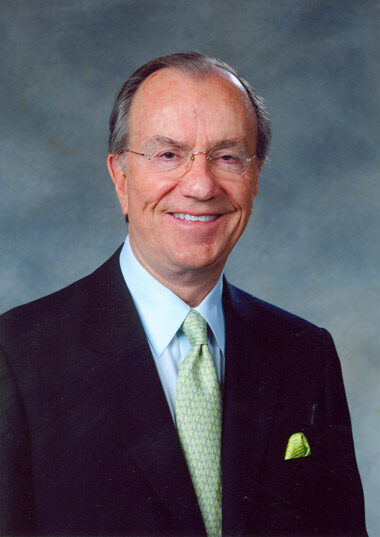James A. Patterson
Class of 2002
- Owner and President Pattco, LLC

Treasure your integrity'you can only lose it once.
James Patterson was born in 1933 in Louisville, Kentucky. His family lived on a dead-end street across from a factory where his father worked every day of his adult life. "Our neighborhood was poor, but we were all ignorant of our poverty because we didn't know anything else," says Patterson. "We lived in a cold-water flat that had no bathroom. We had four shotgun rooms, but we never used the front room because the heat from our coal stove didn't reach it."
Patterson's father was in his 50s and the nearest sibling was 11 years old when Paterson was born. "It really felt like I was an only child," he says. His parents had attended one-room schoolhouses only until the third grade. Patterson describes his home life as somber and dysfunctional. He had a distant relationship with his father but was close to his mother. "She was a very sweet, religious lady who had a heavy heart," he says. "I remember that she cried a lot."
At the age of 12, Patterson got a work permit and started earning his own way. In fact, he never received any money from his parents again. In those days, he worked as a delivery boy for a drug store and as a janitor in a dry goods store.
A natural athlete, Patterson played football and baseball in high school. His skills as a baseball player earned him a scholarship to the University of Louisville, which he eagerly accepted. The only member of his family to graduate from high school, he knew education was the first step toward a better life.
Patterson majored in marketing, participated in the U.S. Air Force ROTC program, and worked his way through school to supplement his scholarship. The university employed him for several hours during the day, and he worked evenings as a janitor in the factory across from his home. On weekends, he worked at the dry goods store.
During his senior year, he began selling insurance. Patterson quickly learned that he was a natural salesman and earned $15,000 in one year, a substantial sum in 1955. He noticed that the most successful people he encountered were those who owned their own businesses.
Patterson credits the military with honing his management skills. He also used his time in the Air Force to add to his savings. Following his discharge in 1959, Patterson met a man who had begun to franchise coffee-house restaurants under the name Jerry's. Even though he had no experience running a restaurant, Patterson felt this was an opportunity he could not miss. He decided to become a franchise owner and withdrew the $10,500 he had saved in the Air Force. He combined that with a bank loan and remodeled an old restaurant, re-opening it as Jerry's in 1959.
"Jerry's was a good lesson," says Patterson, who had to learn the restaurant business while struggling to run it. "I almost gave up in despair several times," he says. "If I hadn't owned it, I would have walked away from it." Finally, his efforts began to pay off, and within eight years he had three Jerry's outlets.
Patterson, who at this point had begun to expand into real estate development, attended a one-week course at Harvard for CEOs of small corporations. He returned to Louisville filled with confidence and a renewed energy toward developing new businesses. He noticed that Kentucky Fried Chicken was becoming successful in Louisville, which got him thinking about alternatives to chicken. He created Long John Silver's, a carry-out fish restaurant, and became president of the new enterprise.
By 1975, Long John Silver's was making most of its parent company's profits, and the parent company wanted to absorb Patterson's 40 percent ownership. In what he describes as a "painful episode," Patterson left his position as president and received $20 million for his share. For the first time since he was 12, he was out of a job. After what he describes as a depressing weekend, Patterson woke up the following Monday morning and realized he had as much ambition as ever.
Patterson became a Wendy's franchisee and formed Western Restaurants, Inc., which eventually operated 47 Wendy's outlets. Throughout the 1980s, Patterson founded or was instrumental in starting several businesses, including Chi-Chi's, a Mexican restaurant chain; AmeriCall; First Phone, which merged into what became WorldCom; Rally's Hamburgers, a drive-thru restaurant chain; and Gulfstream Petroleum Services, an oil and gas exploration company.
Patterson says his success is partly the result of the mentors he had early in life. "In elementary school, I had a nun who took a special interest in me," he says. "In high school, the owner of the dry goods store talked to me about life. When I was playing baseball in college, a guy on the team helped me get into the insurance business. All my mentors gave me advice, attention, opportunity, and respect. My mother and my wife, Dot, whom I met when I was 15 and whom I call my guardian angel, taught me the importance of integrity, persistence, and honesty."
Asked about his Horatio Alger Award, Patterson compares it to "entering life's Hall of Fame." His advice to Horatio Alger Scholars is to get an education and then get involved in something they can feel passionate about. "Be persistent; deal with people with integrity and forthrightness," he says. "Don't sell yourself short, keep your antennae up for opportunities, and then have the courage to take the lead."
